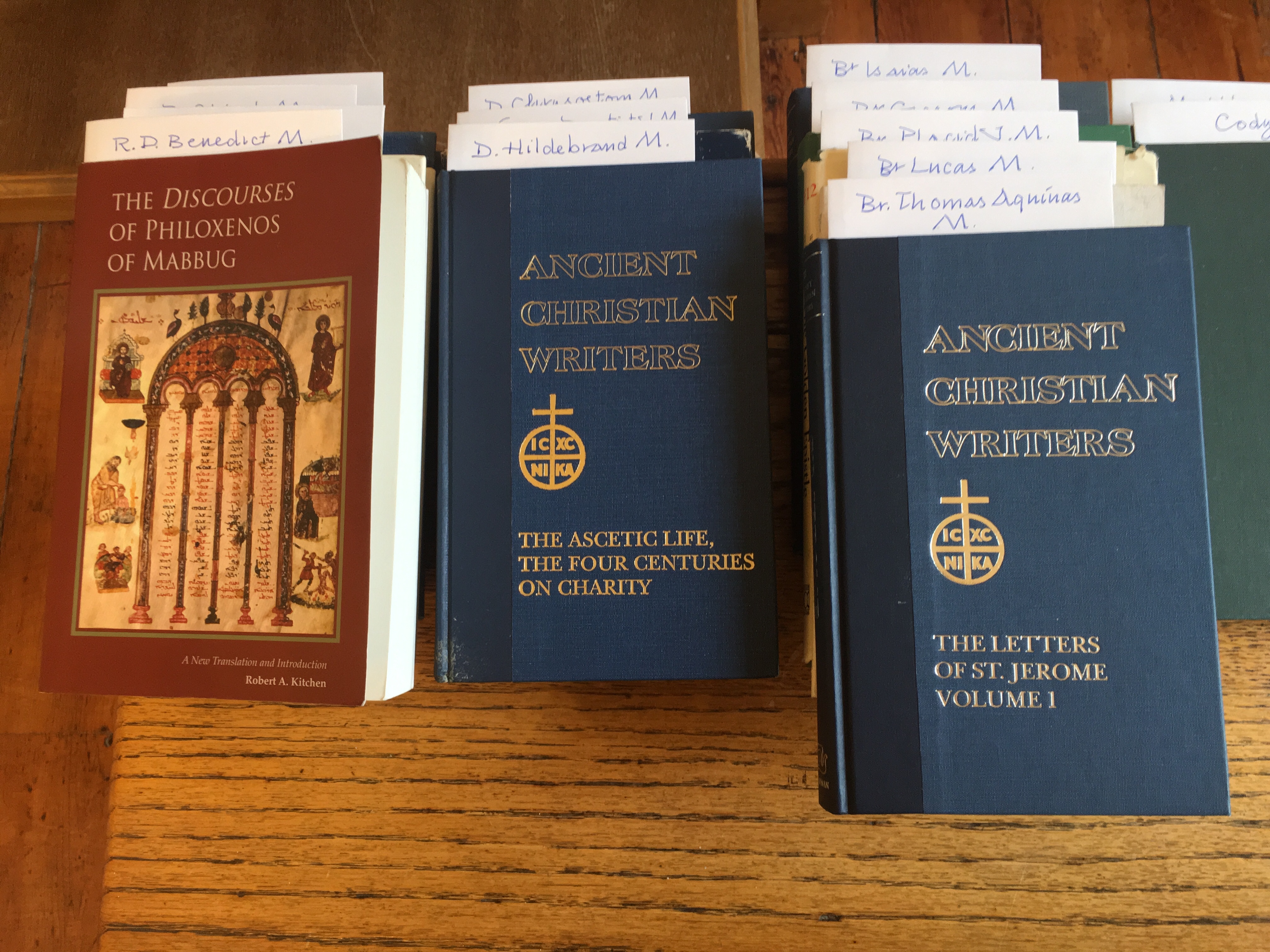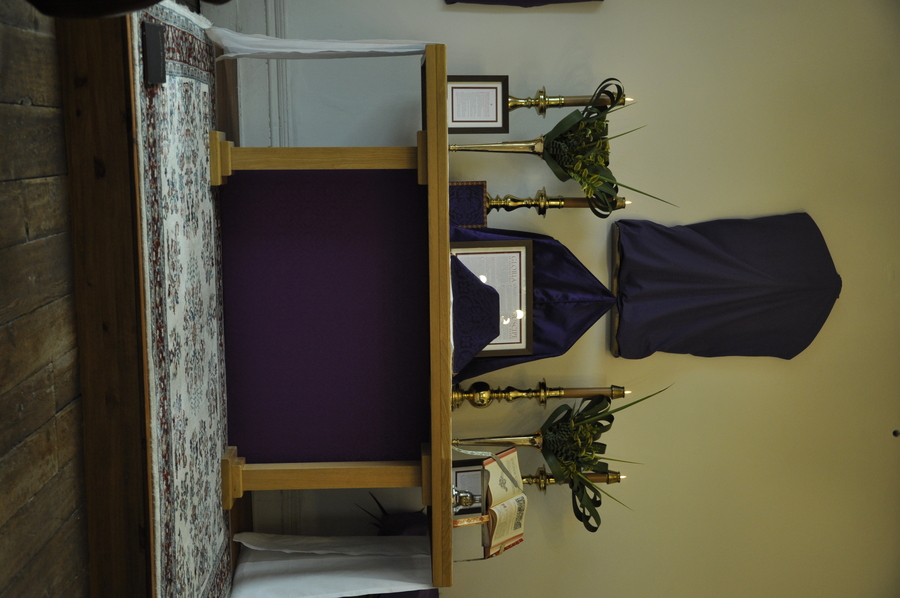Cum gaudio Sancti Spiritus (XLVIII and XLIX)

Lenten Books Ready for Distribution in Chapter
CHAPTER XLVIII. Of the daily manual labour
28 Mar. 28 July. 27 Nov.
. . . During Lent, let them apply themselves to reading from morning until the end of the third hour, and then, until the end of the tenth, labour at whatever is enjoined them. And in these days of Lent let each one receive a book from the library, and read it all through in order. These books are to be given out at the beginning of Lent. Above all, let one or two seniors be appointed to go round the Monastery, at the hours when the brethren are engaged in reading, and see that there be no slothful brother giving himself to idleness or to foolish talk, and not applying himself to his reading, so that he is thus not only useless to himself, but a distraction to others. If such a one be found (which God forbid) let him be corrected once and a second time; and if he do not amend, let him be subjected to the chastisement of the Rule, so that the rest may be afraid. And let not one brother associate with another at unseasonable hours.
CHAPTER XLIX. Of the Observance of Lent
31 Mar. 31 July. 30 Nov.
Although the life of a monk ought at all times to have about it a Lenten character, yet since few have strength enough for this, we exhort all, at least during the days of Lent, to keep themselves in all purity of life, and to wash away, during that holy season, the negligences of other times. This we shall worthily do, if we refrain from all sin, and give ourselves to prayer with tears, to holy reading, compunction of heart and abstinence. In these days, then, let us add some thing to our wonted service; as private prayers, and abstinence from food and drink, so that every one of his own will may offer to God, with joy of the Holy Spirit, something beyond the measure appointed him: withholding from his body somewhat of his food, drink and sleep, refraining from talking and mirth, and awaiting Holy Easter with the joy of spiritual longing. Let each one, however, make known to his Abbot what he offereth, and let it be done with his blessing and permission: because what is done without leave of the spiritual father shall be imputed to presumption and vain-glory, and merit no reward. Everything, therefore, is to be done with the approval of the Abbot.
Holy Lent begins today with the distribution of the Lenten books and the distribution of blessed ashes. Every brother finds himself today in the position of one who is utterly poor, of one who has nothing to offer and everything to receive. Each of you will present himself with empty hands to receive the book that will be his Lenten companion and, in some way, his daily provision of manna in the desert. Each of you will present himself with a bowed head to receive the blessed ashes that represent the nothingness of our condition as creatures. Today, God waits not for inflated programs of prayers and good works, but for contrite and humbled hearts, for the empty hands of the man dispossessed of himself, for the pleading gaze of the beggar, for the cry of the blind man at the wayside: “Jesus, son of David, have mercy on me” (Luke 18:38).
The Benedictine Lent is marked principally by a more generous application to holy reading. We read in our Declarations, article 125:
The principal Lenten observance enjoined in the Holy Rule is a more generous allotment of time to lectio divina. The Prior will, then, at the beginning of Lent, set aside for the whole community one additional hour of lectio divina, to be spent either in one’s cell or in choir. No one will dispense himself from this observance without the Prior’s permission. Obedient to the injunction of Our Holy Father Saint Benedict, the Prior will distribute well-chosen books to the brethren at the beginning of Lent as indicated in the Customary.
Practically speaking, this means that the tower bell and the house bell will be rung each day at 3:55 in the afternoon to signal the beginning of the Lenten time of lectio divina. In addition to the more generous allotment of time to reading, we observe the Lenten fast as indicated in our Statutes, article 125a:
During Lent, the community fast daily, save on Sundays and feasts of precept, by having but one meal and two small collations. The Prior will relax the fast in favour of the sick, the aged, and those engaged in heavy manual labour.
Following a custom enjoined by Mother Mectilde, we shall sing the sequence Stabat Mater every evening before Compline, using the simple melody give in the Cantus Selecti (p. 126*) on Monday through Thursday, and the melody given in the Graduale for 15 September on Friday through Sunday. This year we shall offer the singing of the Stabat Mater for all bishops and priests of the Church, both living and departed.
The Lenten character that Saint Benedict would see in our life at all times is one of penthos, that is of godly sorrow for all that has disfigured, or soiled, or obscured the beauty of the Divine Image in us; of perseverance in prayer by which we cry out, as did the blind man of Sunday’s Gospel, magis ac magis (more and more); and of joy. The joy of a monk in Lent is irrepressible. It is the joy of a desire that he knows will be fulfilled: the joy of sacramental union with Christ in the mysteries of His Passion, Death, Resurrection and Ascension.
You never saw him, but you learned to love him; you may not see him even now, but you believe in him; and, if you continue to believe in him, how you will triumph! How ineffable your joy will be, and how sublime, when you reap the fruit of that faith of yours, the salvation of your souls! (1 Peter 1:8–9).

